The Swan Princess Beauty Pageant: Parade or Parody?
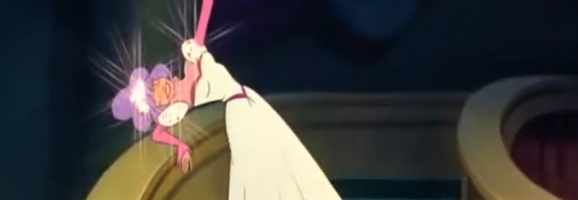
As Queen Uberta would say, “I know that some of you simply abhor beauty pageants” but I could not resist examining how Princesses on Parade contributes to the bigger picture of Nest Family Entertainment’s The Swan Princess. The second longest song on the soundtrack, at just over four minutes, it curiously advertises unattached princesses at a ball where the prince does not consider himself a bachelor. Unlike his mother and guests, however, we know that this is not the day that Prince Derek will say “Where have you been all my life?” He is not looking for a bride; he is waiting anxiously for Princess Odette to arrive so he can prove his love to the world. Derek must endure the awkwardness and pleasantries until she arrives.
Isolated from context, this sequence becomes an excellent opportunity for feminists to cry out against the derogatory depiction of women—eight of them nameless and nearly identical dancers, and all on display in a competition to please Derek. This is offensive and uncomfortable to watch! But that is where the point becomes lost: that Princesses on Parade is supposed to be that way.
Princesses on Parade does not carry on, ignorant of the effect it has upon the viewer. It should evoke discomfort, diverging as it does from everything The Swan Princess has established from the beginning. Consideration of Princesses on Parade within fuller context and juxtaposed with the main theme of loving someone for more than just their outer qualities reveals its true meaning— to act as parody and critique of how culture objectifies women.
Fitting Into the Larger Whole
Princesses on Parade is designed to provide contrast to the main theme. It urges Derek to obsess over strangers’ beauty, even after he has learned that the person he loves most is offended by such frivolity. Odette rejects him when he fails to express his love for anything other than her beauty. It is hard to forget the infamous words that ruin Derek’s first proposal and make the message clear. Not even Rogers, the court musician will let Derek live them down: “She asks, ‘Is beauty all that matters’ and you say, ‘What else is there?!’” By the time of the ball, Derek has long since accepted his part in the exchange as having been “stupid” and resolved to prove his love for Odette. Rothbart’s spell provides structure to his intentions, requiring him to make a vow of everlasting love and prove it to the world. The audience, picking up on the parallels between the two quests, accepts that The Swan Princess will not conclude without Derek finally fixing his first mistake and addressing Odette’s inner qualities. This makes Princesses on Parade, a song obsessed with gaze and glamor, come as an unsettling shock.
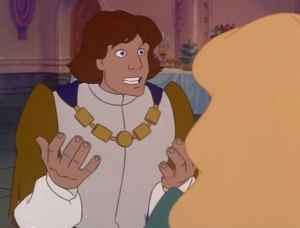
While Derek may be determined to find Odette, Uberta brushes off his loyalty as foolishness and reminds Rogers of the hundreds of affirmative responses to her ball invitation. “One of THESE is bound to change his mind.” Uberta has no concept of the depth of Derek’s love beyond sentimentality, and no concept of the movie’s main theme. She is the one who plans the ball as a beauty pageant, hoping that Derek will find another pretty face to fall in love with.
Uberta has raised Derek by herself, installing within him the belief that beauty and power are the two most important attributes in a woman, because they are what society has taught her to value in herself. This is evident in that Derek feels the need to add “But, please, mother, don’t make it into one of your beauty pageants” as though such are typical, recurring, events in his kingdom. Had Derek permitted her influence to dictate his thinking, then Princesses on Parade would have been a very different scene. Derek would have taken the permission to flirt with other girls, condemning Odette, figuring that it was her own fault that she got turned into a swan. He would think her crazy to have rejected him in the first place, given that so many single, dazzling, ladies at the ball are ready to say “yes”. Derek would have lost interest in Odette, with all the visual stimulation, and pursued someone much easier to marry, just as his mother predicted.
Surprisingly, this makes Uberta an overlooked antagonist against true love. Uberta does not support his interests, finding Derek’s new pastime to be a bore, despite its significance. He is acting just as the viewer expects, preparing to prove his love by hunting down the Great Animal and freeing Odette. As Derek works to perfect his aim, he looks happy, hopeful, and focused. Meanwhile, his mother and the rest of the nobility sit by drinking tea, apathetic or not supportive. They criticize his efforts because, “Day after day all the prince ever does is practice, practice, practice. Thinking of her and the way that it was. Practice, practice, practice.” Uberta does not realize that everlasting love is what makes him keep Odette alive in his mind after everyone else has given her up for dead.
When the night of the ball arrives, Derek and Uberta switch roles. She is the vibrant, focused, and hopeful one, while Derek loses the luster in his eyes and his energy drops to an all-time low. Their lack of synchronization demonstrates the greater conflict between their perspectives.
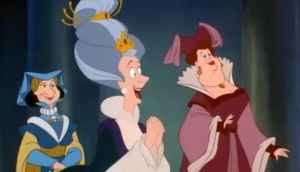
Unlike Queen Uberta’s optimistic view, Lord Rothbart, the “real” antagonist, fears that Derek will not fall for one of the princesses on parade, and decides that the only way to redirect the vow is to send a fake Odette. In doing so, he actually does Derek a favor; he acknowledges the threat that true love poses to his plan. His fear of Derek’s sincerity and determination to prove his love to Odette, and his motivation to keep Derek from breaking his spell, strengthens the audience’s faith in the solidarity of Derek and Odette’s relationship.
Rothbart relies on the fact that Derek will only make his vow to Odette at the ball, and takes advantage of it. Even if Odette does not show up to the ball, nothing is stopping Derek from declaring his vow to a room full of world representatives, and turning Odette back into a human again. Rothbart rants to his assistant, “…Derek’s vow could ruin everything. I’m going to have to deal with him. But how? The vow! I’ll get Derek to offer his vow to the wrong princess. That’s it! I’ll make you look like Odette.” Rothbart’s new scheme is deadly retaliation against Odette’s refusal to marry him. In demonstrating his desperation to keep her from Derek, he gives credence to their spiritual inseparability, much as Derek’s lack of excitement at the parade does.
If Rothbart had believed that Derek’s love was so shallow, determined primarily by physical attraction, then he would not have derived so much pleasure from his revenge, and his tactics would have more resembled Uberta’s. He would have sent his assistant disguised as the most beautiful princess he could imagine and have her outshine the others by giving the best performance during Princesses on Parade. But Rothbart realizes that Derek’s history with Odette is meaningful, since she has refused Rothbart’s hand in marriage every night, and Derek has never stopped searching for her. Rothbart knows that anyone else but Odette would just be swallowed up in the crowd, and that while no one can replace her, he can trick Derek long enough to doom Odette and her prince.
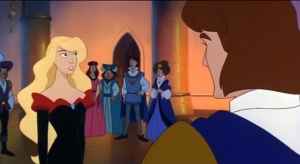
Odette’s impersonator, does not try to persuade Derek to love and trust him, as do the princesses on parade. Rothbart’s deception succeeds because he is aware of the mistakes that Uberta makes in planning Princesses on Parade. Casually, silently, the fake Odette comes up to Derek and lets him have the first word. She does not insist that he make the misdirected vow that Rothbart cannot wait to hear and, after the overwhelming eagerness and pressure that Princesses on Parade exerted, this unobtrusive behavior fills Derek with relief. It feels natural, like it is his idea for once, not as though society is trying to make him do its will. The slight suspicions he does have are numbed by the fact that Odette’s face is comforting and familiar in a sea of strangers.
The Parade Itself
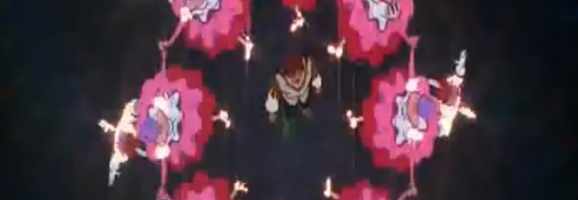
Traditionally, the woman displayed has functioned on two levels: as erotic object for the characters within the screen story, and as erotic object for the spectator within the auditorium, with a shifting tension between the looks on either side of the screen. For instance, the device of the show-girl allows the two looks to be unified technically without any apparent break in the diegesis. A woman performs within the narrative, the gaze of the spectator and that of the male characters in the film are neatly combined without breaking narrative verisimilitude. (Laura Mulvey)
It is eerie how accurately these three sentences can be applied to one extreme interpretation of Princesses on Parade. As one would expect from a children’s movie, the show girl princesses are not seductive in a mature sense, but they still perform as attractive objects, batting their eyelashes, blowing kisses, and posing for Derek’s benefit. This song is meant to provoke a disapproving reaction from the audience, however, and that means there are some clues that make it more critique than mindless parade. For instance, while the beauty pageant justifies why the princesses perform for Derek, the narrative indeed feels broken. The story follows Derek and Odette, not any of these other princesses. We want to know if Derek will be tricked by the hag, and this song feels like an interruption. Still, it grabs our attention, incites our annoyance, and reminds us of the importance of the main theme by slapping it in the face.
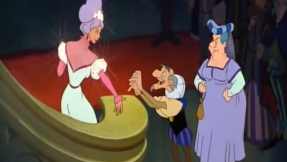
“Beauty and glamor and breeding unmatched,” begins the song, and suddenly it becomes clear that this song will not respect the theme that beauty is not all that matters. “Lovely, enthralling and all unattached,” the song continues, giving Derek permission to lust after the women in front of him. Another man in the audience behaves the way Derek is supposed to–he tries to touch one of the show girl princesses, who teases him with her come-hither smile. Derek stands by, unresponsive.
Throughout the course of the song, Derek greets some unique princesses and eight nearly identical show girl princesses. The Princess of Colchester, Antonia, Griselda, and Brunhilde are all given a brief spoken introduction, providing evidence of the diversity of Derek’s guests. Although their diversity makes them the most memorable, I have chosen to focus on the blandness of the sparkling Octuplets instead. Who are the women behind those perfect, cramped, smiles who are on the screen longer than anyone else? They serve a very significant role in a song that does not have time to introduce every princess that Uberta invited. These are characters whom we will never meet again, of course, so their names hardly bear mentioning, but their obvious lack of distinction stands out. They represent every other princess in attendance.
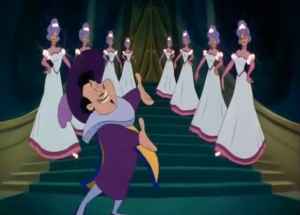
The lyrics simply describe the Octuplets at once, as though each is as similar in personality as she is in outward features. “Born for Success!” The song praises. “Each possesses a spark. Each a remarkable maid…Each the joy of her community, each a golden opportunity!” These lyrics can be applied to any of the princesses there, and generalization renders description meaningless. Unlike Odette, the hopeful princesses long for Derek to flatter her in the giddy hope that she will be the one he chooses. None of these women know Derek, let alone love him, yet all are prepared to marry him. These similarities, working together, is what makes them interchangeable, replaceable, and representative of the masses of participating princesses that we see leaving the carriages but do not join the performance. Meanwhile, Derek silently lets the parade happen to him, holding out for the moment it ends or Odette comes through the door—whichever comes first. He goes through the expected motions of kissing hands and letting himself be pulled into the dance, but he is not exactly losing himself in the excitement.
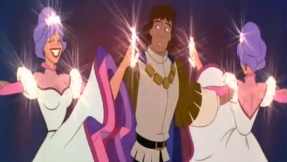
A reluctant, but courteous host, Derek smiles pleasantly at times, as though appealing to everyone to just relax and act naturally, but his silence only encourages the perpetual smiles that circle him. Just as he cannot read their minds, they cannot read his feelings, falsely assuming that “Just the thought that crown-prince Derek will make this choice and he is hysterical.” They attribute his silence to the anxiety of choosing between them, rather than the feeling of entrapment, and the anxiety that Odette has still not arrived.
Since Derek does not join the song, the scene forces itself onto Derek, just as it is forced on the audience. The Octuplets sing “This may be the day that Prince Derek will say…” and then lean in, cupping their ears as though waiting for him to complete their sentence.
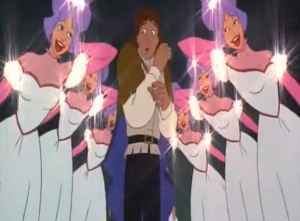
But Derek looks baffled as to what it is they expect. It is Chamberlain, literally Uberta’s trusted servant, who jumps in out of nowhere to fill the gap with “where have you been all my life?” Uberta has told him to make sure that everything runs perfectly, and this is one example of him kneading out a wrinkle on Derek’s behalf. Chamberlain and society tests Derek’s faithfulness to Odette by commanding him to “gaze up—heap praise upon— these radiant, glamorous, luminous, dazzling princesses on parade.”
The Stanford Encyclopedia of Philosophy defines the “male gaze” as being “the frequent framing of objects of visual art so that the viewer is situated in a ‘masculine’ position of appreciation.” This would be a strange technique to include in a movie targeted at young girls, if not for the fact that it is done in the style of parody. The song calls blatant attention to the male gaze by commanding Derek to gaze upon his guests three times. When he does, Derek does not do a whole lot of appreciating. The beautiful women manage to coax a smile from him, but Derek’s expressions mostly range between wonder and anxiety. By identifying with him, we borrow the feeling of bewilderment that can be seen on his face.
As much as Chamberlain must put words in Derek’s mouth, so too must he focus Derek’s gaze. Inappropriate for such an occasion, Derek’s uncooperative attention drifts subtly above the princesses’ heads, most likely up to the door where Odette will arrive. Chamberlain pulls Derek down at one such time, and directs him how to look. The lens of the next scene becomes visible, the space literally framed between Chamberlain’s hands. In this way, Princesses on Parade betrays the gaze, makes it visible, and demonstrates how society seeks to influence our cognition.
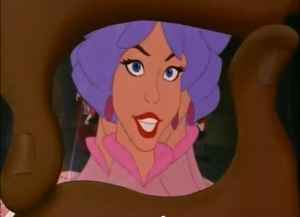
Princesses on Parade should be lighthearted and humorous, but it should also make your skin crawl. The ball and the song that goes with it is dreamed up by Derek’s mother and then thrust on Derek against his will. Rather than fluff, this song creates the opportunity for beauty and love to clash, because no one can choose a wife in one night and be guaranteed to have both. Juxtaposed with the main theme, the ball scene tests Derek’s loyalty, patience, and sincerity to change the way he sees the world. We bear through it with him, waiting for the distractions to disappear so that he and Odette can finally reach resolution together.
Works Cited
Korsmeyer, Carolyn. “Feminist Aesthetics.” Stanford University. Stanford University, 07 May 2004. Web. 05 May 2014. <http://plato.stanford.edu/entries/feminism-aesthetics/>.
Mulvey, Laura. “VISUAL PLEASURE AND NARRATIVE CINEMA.” Screen 16.3 (1975): 6-18. Wiki Brown University. Brown University, 10 June 2009. Web. 5 May 2014.
The Swan Princess. Dir. Richard Rich. Perf. Jack Palance, Howard McGillan, Michelle Nicastro. Nest Family Entertainment, 1994. DVD.
What do you think? Leave a comment.
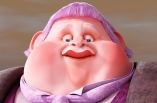
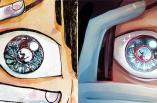



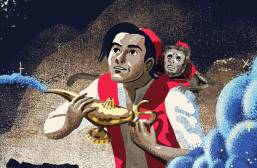
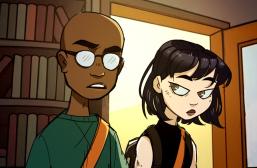




Personally I think that if Brunhilda took the plates off of her face, she’d be prettier than Odette. Don’t get me wrong! I love Odette and this movie, I just think she’d be prettier
I think princess on parade is one of the best songs in the movie, but all are great. 🙂 The songs here have a lot of 40’s quality to them, especially this one. I’m reminded of Ziegfeld’s Follies!
when I was little I wanted to be one of the princesses, but now…I just feel bad for derek.
I, uhm, just wanna say that I love the Swan Princess, all movies. I don’t care about the plotholes or anything else that some may deem as a fault. I was what about five when I first saw the first one and I am now 23. Whoah, doesn’t time fly by really fast, lol. I adore the other two as well.
I could watch all three multiple times in a day if I so wish it.
So, yes the trilogy is one of my personal favourite childhood movie of all time, it even beats the Lion King, which is number 2 on that list of mine. Lol.
I agree I could watch this movie every day and never get bored it is such a fun one
I just watched the film for the first time in many years just yesterday (it was always a favorite with me, my mom, and my sister) and I recognized the need of a Disney touch. The movie was practically a traditional Disney flick excluding the mediocre animation quality and the musical number, “No Fear”. I would like to see Disney take a shot at this not only because of their current lack of good movies that inspire children and contribute to the growth of their imaginations, but also I believe that if it was re-created in the traditional animation style, it would do the original “Swan Princess” justice. The Disney of the 90’s were masters of CHARACTER DEVELOPMENT AND STORYTELLING (something which they seem to have lost over the years) and could do well with the one dimensional characters of the original. The Walt Disney compony is falling into a sort of PWD (Post Walt Death) PLM (Pre Little Mermaid) limbo of not quite good movies once again. It will only be a matter of time before they return to the Little Mermaid’s, Beauty and the Beast’s, Alladin’s, Pochahantas’s, and Lion King’s of the early and mid 90’s and I think that “The Swan Princess” would be an excellent, show stopping, Beauty and the Beast of the present decade. A excellent duet of “Far Longer Than Forever” could come out of this one with some popular Adult Contemporary stars (Celine Dion, Peabo Bryson reprise MAYBE) for the credits, of course in the tradition of Dion and Bryson’s “Beauty and the Beast”, Secada and Shanice’s “If I Never Knew You”, and Bryson and Belle’s (as in Regina Bell) “A Whole New World”.
It wasn’t a Disney film to begin with – people just think it is because Richard Rich worked on The Black Cauldron and The Fox and the Hound!
If Disney do remake it, I hope it’s not for at least five years. It wouldn’t be the same and also they would be better not using 3D animation, it would ruin the original.
I read in the trivia on IMDB that “Richard Rich originally pitched the idea at the Walt Disney studio while he was working there, but the idea was rejected.” Looks like they missed out on a great opportunity!
Haven’t seen the movie but it seems like a rip off.
I mean, it IS loosely based on the Tchaikovsky ballet, but I don’t know if I would consider it a rip-off. It’s definitely not a situation where another studio made their own adaptation and Nest Family Entertainment made this movie to try and capitalize on the momentum. That and this was one of my favorite movies growing up, so them’s fightin’ words.
Hasn’t anybody else realized that the princesses aren’t that bad looking? Especially the ones that are entering the ball, then the ones that are part of the song are wearing odd “fashionable” dresses.
I’ve been watching this movie since I was a kid and it still has one of my favorite opening sequences. However, I just realized at the end of the sequence when Derek announces their marriage and Odette stops him, she gets upset because she wants him to respect her as a person and not marry her based on looks, but isn’t she doing just that?
Great Article! Your critique was structured and well supported and helped me see past my biases and nostalgic love of this film. I completely agree that Uberta is “an overlooked antagonist” because she wants Derek to marry a princess for pragmatic reasons whether that princess is Odette or not. She has Machiavellian ideas, the best case scenario is the arrangement with Odette working out at the beginning of the movie, but if that can’t happen then Derek has to marry someone and become King with a Queen that brings advantages to the kingdom.
Watched it. Didn’t thoroughly enjoy it, though some parts were good/funny/nicely animated and what have you. But umm…Really, there was only one thing on my mind the entire time. The last time I saw the film was 20 years ago. I’m two months away from my 22nd birthday. Now you see why I’m depressed? *sniffles* I’M OLD!!! *sobs*
My friends and I always quote the “What else is there?” scene and laugh so hard – that has to be one of the worst princely screw-ups ever. I’ve always thought the “Princesses on Parade” scene was meant to demonstrate that Derek really loved Odette just like you said, by showing he was interested in more than just outer beauty. One interesting thing I thought of while reading your article – Uberta pushes so hard for Derek to select one of the other princesses based on their looks, but she acts upset when Derek blurts “What else is there?” to Odette – makes it seem like she expects Derek to value beauty over all, but to know better than to admit to feeling that way
The first time I watched the movie as a child, I though Uberta was upset that Derek hadn’t expressed his love….but now I know better to agree with you. She is just upset that he screwed up his big moment!
Also my friends and I use that quote “What else is there” all the time. It’s fun to see who gets it!
This was quite a fascinating article. While thinking about the Octuplets, I was struck by the three who also show up in Beauty and the Beast. They’re the three ditzy blondes dressed in red, green, and yellow, and are basically Gaston’s fangirls. They fulfill a similar purpose to the Octuplets, in that they are three women who look exactly alike (aside from the colors of their dresses) and symbolize the fawning masses swooning over Gaston. Even their lyrics evoke similar feelings to that of the Octuplets; they can be replaced and want only one thing – their ‘prince.’
Yes I’m beginning to notice the use of generics to reach this effect in several movies (like The Emperor’s New Groove). Replaceable is an excellent word to use.
This article is a fascinating take on a movie I haven’t thought about in an incredibly long time. I absolutely love it when authors take up themes from childhood that I never would have been able to think about when I was little. You’ve made me almost want to dig out my VHS and see for myself with new eyes everything the Swan Princess has to offer.
Yes, watch it again! 🙂
This is the perfect way of summing up my reaction to the article. I did not know I wanted to read this. This is no insult either. I disliked the song. I disliked the part in the movie. I always felt tempted to fast forward through the scene, never did, endured it with Derek, and finally got to the last battle afterwards.
The way you describe the scene let me know something I could not put my finger on before. Why I hated that scene. Now, I know. And through that hate, I am able to appreciate it. Thanks for this article. This was a fascinating take on a movie I have not seen for over five years and yet remember it so vividly.
Very good. 🙂
Thank you for this meaningful comment!
I never really thought of it as a test for Derek, which is an interesting interpretation, but as a defining moment of Derek and his mother’s off-kilter relationship. You touched on this in the article: Uberta is not a great mother when it comes to understanding her son. She has set expectations for what should and shouldn’t happen, usually based on what she wants or doesn’t want to happen. When Derek ruins his chance with Odetta “in five syllables or less,” Uberta’s reaction is that she wasted “years of planning,” rather than asking her son how he feels or what he plans to do.
When Derek does start taking action, sort of, by practicing constantly, Uberta misinterprets his practice as a reflection of his ‘survivor’s guilt’, so to speak. She’s not seeing it as his love but his sense of obligation because her character isn’t one to look deeper into people’s actions (that opening number proves this several times) – she takes actions at face-value. That’s why she wants to prepare the ball; she thinks he’s trying to make up for his mistakes, which led Odette to be on that road at that time. She thinks they think similarly. He did ask “What else is there?” when Odette asked for compliments more than “You’re beautiful”. I think Uberta took that at face value later and decided that was what Derek wanted, and she would give him that somehow to pull him away from some sort of guilt-fueled obligation.
She’s not reading his determination as love and I think that’s important to understand. He never told Odette he loved her (in front of his mother, at least); he said, “You’re all I’ve ever wanted. You’re beautiful.” She doesn’t see the love because, a) he never said it, b) what he did say was superficial, and c) they clearly don’t talk to each other very often. Uberta is a character who leaves behind “wasted” plans rather than attempt to salvage them; she doesn’t want to waste more time, she wants to move on to the next thing and the next thing. I think “Princesses on Parade,” aside from not being the first ‘pageant’ attempt, doesn’t show what Uberta wants Derek to think or be like but rather shows what Uberta misinterprets her son to be like. Not to mention, when she brings up this next attempt, he doesn’t say “But I love, Odette, Mother,” he says, “Just don’t make it into one of your beauty pageants.”
I think the issue shown by this scene is not Uberta forcing her ideals on Derek but her clear misinterpretations of him because of their serious lack of clear communication. She’s doing what she can with the little information she has about Derek’s romantic relationships. Great article!
Wow thank you for this comment! It is a pity that Uberta assumes what is best for Derek, as though she can read his mind or fix his heart, but, as you point out, they don’t think the same way. It is also a pity that Derek lacked the maturity to articulate his feelings when it matters. This flaw adds to the conflict and allows him room to truly grow up at the end.
You are right–poor communication is at the root of their very interesting relationship. Derek is trying to please his mother as much as she is trying to please him, but both are just pretending to be happy. I’m reminded of that scene where Derek actually becomes enthusiastic about the ball for once, having invited Odette. He not only looks happy but he even begins to play an active role in organizing the event. He demands white roses, he changes the menu, he directs the band to play something swan-like. And, I recall, it is then that his mother becomes giddy and teary eyed to see him clearly in love and living life. They share a moment of genuine happiness, but Derek still won’t answer when she asks “Who is she?”
“You’ll know.” His answer is cryptic but at the same time is spoken as though the answer goes without saying. “Believe me, you’ll know.” He visualizes that dramatic moment where Odette walks in and everyone realizes that his loyalty to Odette and his determination to find her has paid off despite their attempts to make him forget her.
And yet, Uberta still does not immediately recognize “Odette” at the ball because it has never been obvious to her that the two were ever in love.
!
😀
~Constellation
There seems to be a focus on the dangers of the superficial.